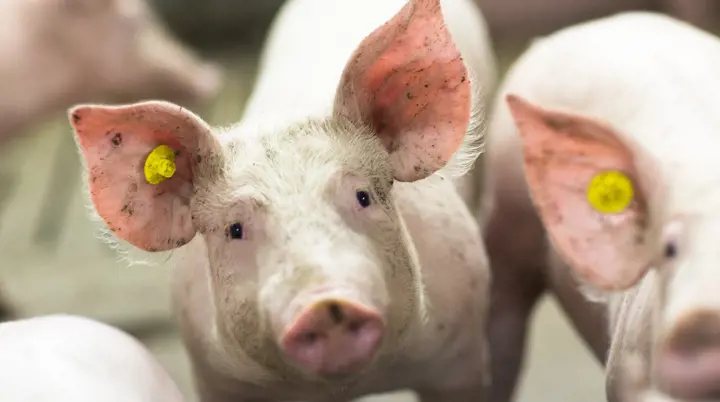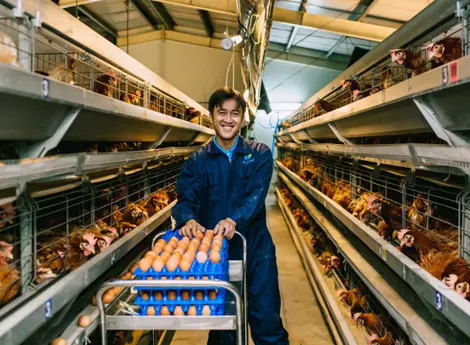How sharing knowledge improved the health status of pigs in Brazil
By sharing knowledge with all our business units, we help farmers worldwide to power progress on their farm. In 2019, Marcino & Daniel from Brazil took part in the Natural Power training in the Netherlands. Marcino is originally a vet and has worked for De Heus Brazil since 2014. During his training, he visited eight farms with more than 8,000 sows and learned all about the Dutch pig sector. His main goal was to learn how to support farmers in Brazil improve the health status on their farms.

in Brazil
Who is Marcino?
Marcino began as an intern at De Heus, going on to spend two more years working on research for De Heus Brazil. He then became a formulator and he is now working as a nutritionist. Marcino: “I look after the swine in South America: Brazil, Chile, Bolivia and Paraguay.”
The challenge facing De Heus Brazil
Due to legislation in Brazil, antibiotics are still approved there. In 2021 a new pre-med law will be implemented in Brazil, called IN 65. This is a normative instruction that affects the use of antibiotics in Brazil. “To minimise the use of antibiotics, we did several tests to understand the effects of our feed concept Romelko. We wanted to get insight into the influence it can exert on reducing the use of antibiotics,” says Marcino.
Different results during research
Marcino: “We tested Romelko at the University of Londrina where De Heus built a research centre. The same research was performed on one of our partner farms. We encountered very different results in both places. We needed to understand how to optimise the health of animals on commercial farms and how to advise our farmers better. We therefore asked De Heus in the Netherlands how the Dutch farms went on to make the transition to reducing the use of antibiotics and preserve the high health status.”
Keep an open mind
“As a vet, I was working on how our Romelko concept could improve piglets health. When I was invited to do the training in the Netherlands, I wanted to be part of the discussion and learn other perspectives and views about this feed concept. The most important thing was to go to the Netherlands with an open mind. Because the Netherlands is a totally different market than Brazil. It was time to watch and learn and decide what I could implement in Brazil.”
Different health status
“During our training, I saw a totally different health status on Dutch commercial farms compared to Brazilian commercial farms. Which opened my eyes. We needed to create new tools to solve the challenges we face in Brazil. This way we can help our customers to work with a high health status level and achieve the same results with the Romelko feed concept as in The Netherlands.”
No need to reinvent the wheel
“We know the process but this process must be consistent. It must be followed step by step. At the end of the training, we created a scenario that allows farmers to change the health status of the animals on Brazilian farms with a 16-step plan. One step at a time, farmers can go forward and change the health status on their farm. We don’t need to reinvent the wheel but make the process a daily habit.”
Back in Brazil
“Back in Brazil, we realised that the results in our own research facility were better than on a commercial farm because of the process control and consistency. We realised that we needed to create a tool to help farmers improve the health status step by step. This program is called the natural power solution. Through this program, we can advise the farmer about the use of antibiotics and correct when necessary to achieve optimal health on farms.”
This program is built on three pillars:
- The first pillar is about creating an immune balance.
- The second pillar is about creating the ambience that the animal needs.
- The third pillar is about reducing the effects of contamination on the pigs.
With these three pillars, we created the tools that support our farmers step-by-step. Because a farmer can describe his status in all the pillars, we can advise our farmers on possible improvements in all stages and situations.”
Plant the seed
“Our first step was to create and test the new concept which suits the Brazilian culture. Then it was time to share the knowledge with farm managers. After planting the seed, it was time to harvest the knowledge and to start with 4 which were ready to work with the concept and take the health status of their farm to the next level. We have had positive results, but we are still improving our tool and gaining more insights.”
Animal health is what drives us not reducing antibiotics
“When we talk about the natural power solution to our farmers, animal health is the focus of the discussion, not reducing antibiotics. Reducing antibiotics is a result of improved animal health. That's the key. The basis of all our advice is always animal health. When we focus on animal health the reduction of antibiotics is part of the result” concludes Marcino.


